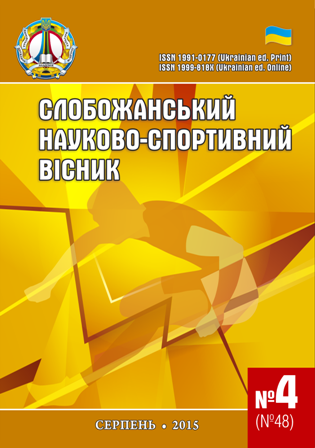Socio-pedagogical conditions of formation of culture of motor activity in students of secondary schools
DOI:
https://doi.org/10.15391/snsv.2015-4.006Keywords:
physical culture, pupils, culture of motor activity, motivation, healthAbstract
Purpose: the analysis of characteristics of the formation of a pupils conscious attitude of engaging in physical culture, preferences to the direction of physical education, to health and fitness activities, etc. Materials and methods: the sociological research which was conducted among students of the fourth-eleventh grades of the secondary school № 67 of Kharkov. Results: the desire to attend lessons of physical culture reduces at pupils during the period of a study at the school. However, the use of sports games on lessons of physical culture gives them the greatest interest. Moreover, the analysis of the obtained materials showed that sports minutes are used from sports and health-improving actions the most regularly, which are must be carried out in the mode of a school day. It was revealed that the highest physical activity of pupils is on the lessons of physical culture during a day. Conclusions: the research confirms the role of social and pedagogical factors influencing the students’ motivation to sports activities. Due to the results these factors determine the effectiveness of the system of physical education.
References
Bezverkhnya G. V. Motivatsіya do zanyat fіzichnoyu kulturoyu і sportom shkolyarіv 5–11-kh klasіv : avtoref. kand. nauk fіz. vikhovannya ta sportu [Motivation for physical education and sport students in grades 5–11 : PhD thesis], Lviv, 2004, 23 p. (ukr)
Bodnar І. Sportivniy vіsnik Pridnіprov’ya [Sports Bulletin Dnieper], 2013, vol. 2, p. 257–264. (ukr)
Bodnar І. Naukoviy chasopis Natsіonalnogo pedagogіchnogo unіversitetu іmenі M. P. Dragomanova. Serіya 15, Naukovo-pedagogіchnі problemi fіzichnoі kulturi (fіzichna kultura і sport) [Science magazine National Pedagogical University MPDragomanov. A series of 15 scientific-pedagogical problems of physical culture (physical culture and sports)], Kyiv, 2013, Vol. 7 (33), p. 509–519. (ukr)
Golovchenko O. І. Slobozans’kij nauk.-sport. visn. [Slobozhanskyi science and sport bulletin], Kharkіv, 2012, vol. 3, p. 148–152. (ukr)
Dutchak M., Tkachuk S. Fіzichna aktivnіst, zdorov’ya і sport [Physical activity, health and sport], 2012, vol. 2(8), p. 11–16. (ukr)
Kutek T. B. Slobozans’kij nauk.-sport. visn. [Slobozhanskyi science and sport bulletin], Kharkіv, 2013, vol. 3, p. 207–210. (ukr)
Krutsevich T., Pangelova N. Sportivniy vіsnik Pridnіprov’ya [Sports Bulletin Dnieper], 2012, vol. 2 (163), p. 4–6. (rus)
Saіnchuk M. M. Formuvannya tsіnnіsnikh orіеntatsіy v sferі fіzichnoі kulturi і sportu uchnіv starshikh klasіv u protsesі fіzichnogo vikhovannya : avtoref. kand. nauk fіz. vikhovannya ta sportu [Formation of value orientations in the field of physical culture and sports of high school students in physical education : PhD thesis], K., 2012, 24 p. (ukr)
Sutula V. A. Dukhovnіst osobistostі: metodologіya, teorіya і praktika [Spirituality: Methodology, Theory and Practice], 2011, vol. 4 (45), p. 192–198. (rus)
Tomenko O. A. Slobozans’kij nauk.-sport. visn. [Slobozhanskyi science and sport bulletin], Kharkіv, 2013, vol. 3, p. 19–24. (ukr)
Ugnіch І. V. Slobozans’kij nauk.-sport. visn. [Slobozhanskyi science and sport bulletin], Kharkіv, 2010, vol. 3, p. 18–22. (ukr)
Deyneko A. Kh., Bondar A. S., Kuzmenko І. O., Bulgakov O. І., Grishchenko L. K. Slobozans’kij nauk.-sport. visn. [Slobozhanskyi science and sport bulletin], Kharkіv, 2009, vol. 2, p. 157–160. (ukr)
Downloads
Published
How to Cite
Issue
Section
License
Copyright (c) 2015 (Alfiya Deyneko) Дейнеко Альфія Хамзіївна

This work is licensed under a Creative Commons Attribution 4.0 International License.
Our publications make use of copyright CREATIVE COMMONS open access journals.
Authors published in this journal agree to the following terms:
1 The authors reserve the right of authorship of the work and pass the journal right of first publication of this work are licensed under the Creative Commons Attribution License, which allows others to freely distribute the published work with reference to the authors of the original work and the first publication of this magazine.
2 The authors have the right to enter into separate agreements for additional non-exclusive distribution of work in the form in which it was published the magazine (such as work place electronic repository institution or publish as part of the monograph), provided that the reference to the first publication of this magazine.

 Attention, authors!
Attention, authors!


